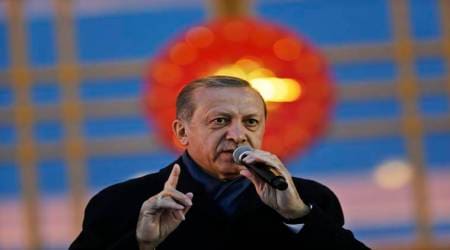 The country’s journalists have not had it easy since Recep Tayyip Erdogan became Turkey’s president in 2014.
The country’s journalists have not had it easy since Recep Tayyip Erdogan became Turkey’s president in 2014.
On Monday, as 17 of his colleagues stood trial at an Istanbul court, Bülent Özdogan, the managing editor of Cumhuriyet, told The Guardian that the proceedings were “not just about press freedom, but also about the government’s campaign in the aftermath of the coup”. He could well have added that the clampdown on the media has become inextricable from the political witch-hunt that has ensued after the failed coup last year in Turkey.
The country’s journalists have not had it easy since Recep Tayyip Erdogan became Turkey’s president in 2014. But the crackdown on the media has accelerated since the coup last July with more than 150 journalists behind bars. More than 160 media outlets have been forced to shut down and nearly 2,500 journalists have lost their jobs. Cumhuriyet’s employees have been accused of aiding the separatist Kurdistan Workers party (PKK) and the Fethullah Gülen movement. The charges are absurd on more than one count. Cumhuriyet is one of Turkey’s most respected media outlets. It has an unimpeachable track record on secularism, and, in fact, was among the few media outlets in Turkey to warn of the dangers of the Fethullah Gülen movement. Besides, the Gülen movement has a history of acrimony with the PKK. But the paper is also one of the last outposts of opposition in Turkey. It has repeatedly criticised Erdogan as authoritarian and advocated negotiations with the Kurdish party, while the Turkish government has focused on a millitary-oriented approach. Cumhuriyet’s former editor, Can Dundar, has been in exile in Germany since last year after being sentenced to five years of imprisonment for “selling state secrets”.
Last month, the UN’s Human Rights Council described the charges against the Cumhuriyet employees as arbitrary. Such strictures mean little for Erdogan. But the Turkish president has often talked about an independent judiciary. The trials will show if those words mean anything at all.

